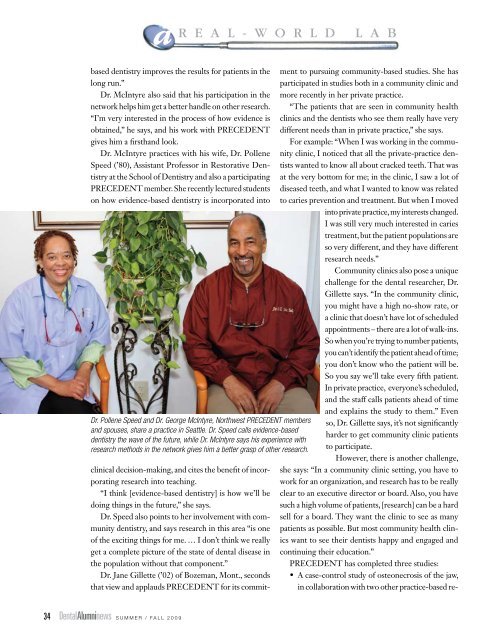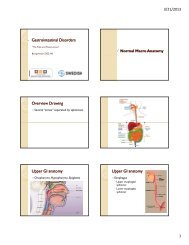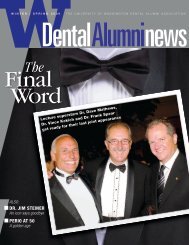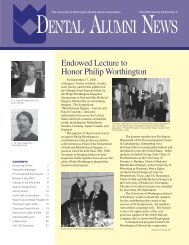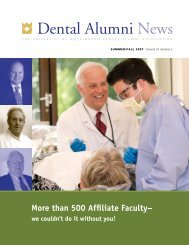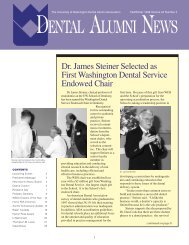dr - University of Washington School of Dentistry
dr - University of Washington School of Dentistry
dr - University of Washington School of Dentistry
Create successful ePaper yourself
Turn your PDF publications into a flip-book with our unique Google optimized e-Paper software.
a<br />
based dentistry improves the results for patients in the<br />
long run.”<br />
Dr. McIntyre also said that his participation in the<br />
network helps him get a better handle on other research.<br />
“I’m very interested in the process <strong>of</strong> how evidence is<br />
obtained,” he says, and his work with PRECEDENT<br />
gives him a firsthand look.<br />
Dr. McIntyre practices with his wife, Dr. Pollene<br />
Speed (’80), Assistant Pr<strong>of</strong>essor in Restorative <strong>Dentistry</strong><br />
at the <strong>School</strong> <strong>of</strong> <strong>Dentistry</strong> and also a participating<br />
PRECEDENT member. She recently lectured students<br />
on how evidence-based dentistry is incorporated into<br />
clinical decision-making, and cites the benefit <strong>of</strong> incorporating<br />
research into teaching.<br />
“I think [evidence-based dentistry] is how we’ll be<br />
doing things in the future,” she says.<br />
Dr. Speed also points to her involvement with community<br />
dentistry, and says research in this area “is one<br />
<strong>of</strong> the exciting things for me. … I don’t think we really<br />
get a complete picture <strong>of</strong> the state <strong>of</strong> dental disease in<br />
the population without that component.”<br />
Dr. Jane Gillette (’02) <strong>of</strong> Bozeman, Mont., seconds<br />
that view and applauds PRECEDENT for its commit-<br />
34 DentalAlumninews SUMMER / FALL 2009<br />
R E A L - W O R L D L A B<br />
Dr. Pollene Speed and Dr. George McIntyre, Northwest PRECEDENT members<br />
and spouses, share a practice in Seattle. Dr. Speed calls evidence-based<br />
dentistry the wave <strong>of</strong> the future, while Dr. McIntyre says his experience with<br />
research methods in the network gives him a better grasp <strong>of</strong> other research.<br />
ment to pursuing community-based studies. She has<br />
participated in studies both in a community clinic and<br />
more recently in her private practice.<br />
“The patients that are seen in community health<br />
clinics and the dentists who see them really have very<br />
different needs than in private practice,” she says.<br />
For example: “When I was working in the community<br />
clinic, I noticed that all the private-practice dentists<br />
wanted to know all about cracked teeth. That was<br />
at the very bottom for me; in the clinic, I saw a lot <strong>of</strong><br />
diseased teeth, and what I wanted to know was related<br />
to caries prevention and treatment. But when I moved<br />
into private practice, my interests changed.<br />
I was still very much interested in caries<br />
treatment, but the patient populations are<br />
so very different, and they have different<br />
research needs.”<br />
Community clinics also pose a unique<br />
challenge for the dental researcher, Dr.<br />
Gillette says. “In the community clinic,<br />
you might have a high no-show rate, or<br />
a clinic that doesn’t have lot <strong>of</strong> scheduled<br />
appointments – there are a lot <strong>of</strong> walk-ins.<br />
So when you’re trying to number patients,<br />
you can’t identify the patient ahead <strong>of</strong> time;<br />
you don’t know who the patient will be.<br />
So you say we’ll take every fifth patient.<br />
In private practice, everyone’s scheduled,<br />
and the staff calls patients ahead <strong>of</strong> time<br />
and explains the study to them.” Even<br />
so, Dr. Gillette says, it’s not significantly<br />
harder to get community clinic patients<br />
to participate.<br />
However, there is another challenge,<br />
she says: “In a community clinic setting, you have to<br />
work for an organization, and research has to be really<br />
clear to an executive director or board. Also, you have<br />
such a high volume <strong>of</strong> patients, [research] can be a hard<br />
sell for a board. They want the clinic to see as many<br />
patients as possible. But most community health clinics<br />
want to see their dentists happy and engaged and<br />
continuing their education.”<br />
PRECEDENT has completed three studies:<br />
• A case-control study <strong>of</strong> osteonecrosis <strong>of</strong> the jaw,<br />
in collaboration with two other practice-based re


